| Srl | Item |
| 1 |
ID:
065595


|
|
|
|
|
| Publication |
2000.
|
| Description |
p.156-172
|
|
|
|
|
|
|
|
|
|
|
|
|
|
|
|
| 2 |
ID:
092453
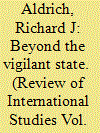

|
|
|
|
|
| Publication |
2009.
|
| Summary/Abstract |
The world of intelligence has grown exponentially over the last decade. This article suggests that prevailing explanation of this expansion - the spectre of 'new terrorism' - reflects serious misunderstandings. Much of the emergency legislation which has extended the power of the state so remarkably was already sitting in the pending trays of officials in the late 1990s. Instead, the rise of both the 'new terrorism' and its supposed nemesis - the secret state - both owe more to long-term structural factors. Globalisation has accelerated a wide range of sub-military transnational threats, of which the 'new terrorism' is but one example. Meanwhile the long-promised engines of global governance are nowhere in sight. In their absence, the underside of a globalising world is increasingly policed by 'vigilant states' that resort to a mixture of military power and intelligence power in an attempt to address these problems. Yet the intelligence services cannot meet the improbable demands for omniscience made by governments, nor can they square their new enforcer role with vocal demands by global civil society for improved ethical practice.
|
|
|
|
|
|
|
|
|
|
|
|
|
|
|
|
| 3 |
ID:
113404
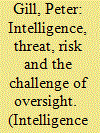

|
|
|
|
|
| Publication |
2012.
|
| Summary/Abstract |
Intelligence studies has traditionally talked in terms of 'threats' though the idea of 'risk' has now entered its language, as it has so many other areas of policy. The key distinction remains the notion of threat of intentional action to cause harm: this is the central preoccupation of intelligence agencies that would not normally consider risks that might arise from, say, the unintended outcomes of accidents or interrupted supplies of resources. Another distinction is that intelligence is normally preoccupied with increasing knowledge in conditions of ignorance or uncertainty, while risk analysis is more likely to be quantifiable. The perception of a 'new terrorism' has led to the importation of the 'precautionary principle' to intelligence with potentially dangerous consequences for democracy. This requires enhanced thinking and practice with respect to the oversight of intelligence activities, especially in developing security networks.
|
|
|
|
|
|
|
|
|
|
|
|
|
|
|
|
| 4 |
ID:
061478


|
|
|
| 5 |
ID:
106575
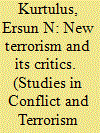

|
|
|
|
|
| Publication |
2011.
|
| Summary/Abstract |
This article attempts to fulfill a lacuna in the literature on terrorism by providing a systematic response to the widespread criticism of the concept of "new terrorism." According to this conceptualization, the "new terrorism" is characterized by religious motivation, networked organizational structures, tendency to launch mass casualty attacks and possible use of weapons of mass destruction. This conceptualization is criticized by scholars who argue that religiously motivated terrorism has always existed; that increased frequency of mass casualty attacks is due to other factors; that traditional terrorists were also indiscriminate in their targeting; and that there is nothing new about terrorist attempts to use WMDs or horizontal terrorist networks. These critics are not convincing on three counts: they adopt a rudimentary notion of "new" which is hardly appropriate for detecting or understanding social change; they employ inappropriate categories and labels, which make it impossible to distinguish the characteristic features of new terrorism from those of the old; and several critics create a straw man version of the "new terrorism" argument by resorting to reductionist interpretations. The article points out that the contemporary terrorism is not only religious, but is also characterized by the absence of several ideological and political imperatives for centralized and hierarchical organizational structures and for using discriminate violence that characterized left wing and ethno-nationalist terrorism of the past. The critics also ignore the fact that there is a declared intention on the part of new terrorists to organize horizontally through networks and to kill indiscriminately among civilians.
|
|
|
|
|
|
|
|
|
|
|
|
|
|
|
|
| 6 |
ID:
156907


|
|
|
|
|
| Summary/Abstract |
This article focuses on the so-called “brutalization” of terrorism. The brutalization thesis as part of the larger theoretical concept of “new terrorism” argues that “new terrorism” is more brutal than “old terrorism.” Many scholars claim that the 9/11 attacks mark the beginning of a new era of terrorism that has lifted international as well as domestic terrorism to a new level of violent brutality. Others argue that this process had already started in the early 1990s. After discussing possible ways to operationalize a brutalization of terrorism, for example focusing on suicide bombings or terrorist attacks against soft targets, this article tests the empirical credibility of the brutalization thesis regarding both potential starting points. Data from the Global Terrorism Database (GTD) shows that only three out of nine indicators increased significantly during the 1990s, partially backing the idea of a general brutalization, whereas increasing numbers of suicide attacks and beheadings after 9/11 support the notion of a qualitative change in terrorism and its brutality connected with the idea of maximizing media and public attention. Yet, these developments are regionally limited and the brutality of this “new terrorism” exceeds the levels known from the zenith of “old terrorism” in the 1970s and 1980s in only a few cases.
|
|
|
|
|
|
|
|
|
|
|
|
|
|
|
|
| 7 |
ID:
082925
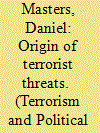

|
|
|
|
|
| Publication |
2008.
|
| Summary/Abstract |
Recent studies indicate that the number of terrorist incidents is declining while their lethality is increasing. This trend in casualty rates has raised the rhetoric on terrorism, leading to claims that a new form of terrorism has emerged over the last thirty years. The "new terrorism" is defined by a tendency towards maximum destruction and a pronounced religious motivation. The question is whether or not the new terrorism is actually driving current trends in terrorist violence? This study examines casualty rates by terrorist groups categorized by their ideologies and finds that trends in terrorist violence are not being driven by the new terrorism per se. Instead, all forms of terrorism are more violent generally, and variations of ethno-national terrorism are the most violent specifically.
|
|
|
|
|
|
|
|
|
|
|
|
|
|
|
|
| 8 |
ID:
051461
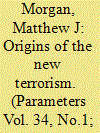

|
|
|
| 9 |
ID:
021518
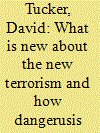

|
|
|
|
|
| Publication |
2001.
|
| Description |
1-14
|
|
|
|
|
|
|
|
|
|
|
|
|
|
|
|